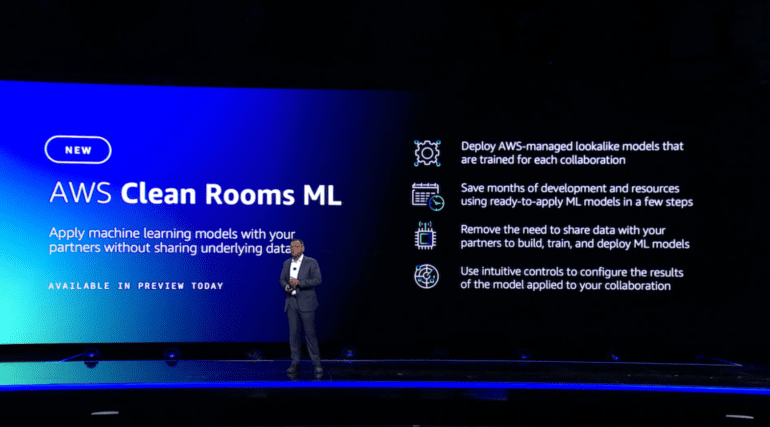TL;DR:
- AWS introduces Clean Rooms ML, a privacy-preserving service for AI collaboration.
- Clean Rooms ML enables secure cooperation without sharing proprietary data.
- Companies can create “lookalike” AI models for joint ventures.
- Fine-tune model outputs to meet specific business needs.
- Future plans to expand Clean Rooms ML for healthcare applications.
- Amazon unveils Clean Rooms Differential Privacy, offering aggregate insights while protecting data.
Main AI News:
In the ever-evolving landscape of artificial intelligence (AI) collaboration, Amazon Web Services (AWS) has taken a significant step forward with the introduction of Clean Rooms ML. This groundbreaking service, currently in preview, empowers businesses to engage in privacy-preserving partnerships while maintaining the utmost data security. Clean Rooms ML is a strategic extension of AWS’ existing Clean Rooms product, designed to facilitate seamless, secure, and efficient cooperation between companies.
One of the key challenges in AI collaboration has been the necessity to share sensitive proprietary data with external partners during the development, training, and deployment of AI models. This concern is now alleviated by Clean Rooms ML, which enables AWS customers to harness the power of “lookalike” AI models without the need for data exposure.
Swami Sivasubramanian, Vice President for Data and Machine Learning Services at AWS, emphasized the game-changing nature of Clean Rooms ML during a keynote address at AWS re:Invent. “With Clean Rooms ML, you can train a private lookalike model across your collective data,” he declared. “You can keep control of your models and delete them when you’re done.” This assurance of data control and privacy is a critical component of Clean Rooms ML’s value proposition.
The core functionality of Clean Rooms ML revolves around the ability to create a “lookalike” AI model through the collaboration of two entities without compromising data integrity. For instance, an airline could share signals pertaining to its loyal customers with an online booking service partner to target and offer promotions to new users who closely resemble their existing clientele. This process enables companies to leverage the power of AI-driven insights without exposing sensitive customer data.
Clean Rooms ML also provides comprehensive controls that allow businesses to fine-tune model outputs according to their specific needs and objectives. Furthermore, AWS has ambitious plans to introduce tailored settings for applications within the healthcare industry, further expanding the scope and applicability of Clean Rooms ML.
In a related development, Amazon unveiled Clean Rooms Differential Privacy, a fully managed service integrated within Clean Rooms. This service employs advanced techniques to obfuscate the upload of customer data while generating invaluable “aggregate insights.” This means that companies can access combined insights on various aspects, such as advertising campaigns, investment decisions, and clinical research, without having to divulge their proprietary data.
Conclusion:
AWS Clean Rooms ML and Clean Rooms Differential Privacy signify a significant leap in secure AI collaboration. These innovations provide businesses with the means to harness AI’s power without compromising data security. As the market increasingly values data privacy, AWS is well-positioned to lead in transforming the landscape of AI collaboration and data protection.

